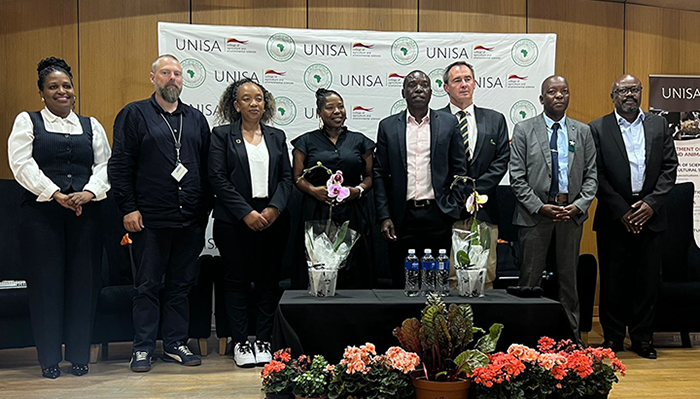
Equipped with state-of-the-art laboratories that provide students with hands-on experiences to bridge theory and practice

From left: Thulile Dlamini (DALRRD), Prof Ashley Gunter (CAES), Dr Ntsiki Maine (City of Tshwane), Prof Ntanganedzeni Mapholi (CAES), Dr Mboneni Muofhe (DSTI), Frederick Fouche (AgriSETA), Prof Julius Tjelele (CAES) and Dr Tshilidzi Madzivhandil (FANRPAN)
The College of Agriculture and Environmental Sciences (CAES) at Unisa, in collaboration with the Food, Agriculture and Natural Resources Policy Analysis Network (FANRPAN), successfully hosted the 2025 G20 Food Security Roundtable on 6 October 2025 at the university’s main campus.
Themed "Ensuring Sustainable Agri-food Systems in line with the G20 Food Security Task Force", the roundtable brought together thought leaders, policymakers, researchers and industry stakeholders from various institutions to deliberate on strategies to strengthen agri-food systems and ensure both global and national food security.
The event was skilfully directed by Prof Julius Tjelele, who guided a robust and insightful programme of discussions.
In his opening and welcome address, Prof Solomon Magano, Vice-Principal: Institutional Development, Unisa, commended the CAES for its continued commitment to addressing issues that lie at the heart of sustainable development. He emphasised the critical role of research, innovation and collaboration in achieving resilient agri-food systems capable of withstanding challenges such as climate change, economic instability and resource scarcity.
Setting the context for the engagement, Prof Ntanganedzeni Mapholi, Acting Executive Dean of CAES, highlighted the purpose of the roundtable as a strategic platform to align Unisa’s research and academic priorities with the broader G20 Food Security Task Force agenda.
"Our mission as an institution is to lead in knowledge creation and application that supports sustainable livelihoods," said Mapholi. "Through forums such as this, we can engage with policymakers, industry, and communities to co-create solutions that safeguard the future of food security in South Africa and beyond."
Delivering the keynote address, Dr Mboneni Muofhe, Deputy Director-General for Socio-economic Innovation Partnerships at the Department of Science, Technology and Innovation (DSTI), underscored the value of science-driven policy and innovation in transforming agricultural productivity and food systems. He called for strengthened collaboration between academia, government, and industry to ensure that scientific research translates into practical, inclusive and sustainable outcomes for communities.
The roundtable featured a distinguished panel of experts who unpacked policy levers, market dynamics, capacity building, technology adoption and climate resilience as central pillars of sustainable agri-food systems.
Frederick Fouche, Executive Manager at AgriSETA, presented on Skills Development and Employment, emphasising the inclusion of women and youth in the agricultural value chain as a key enabler of inclusive growth.
The roundtable further engaged participants through three thematic panel discussions, each moderated by academic leaders from CAES:
Summarising the policy implications and way forward, Francis Hale, Director: Policy Advocacy and Communications at FANRPAN, emphasised four key focus areas: Research Agenda, Indigenous Knowledge Systems, Advocacy, and Transformation. He stressed that collaborative research, innovation diffusion, and capacity building remain essential to achieving sustainable, inclusive, and equitable food systems, aligning with G20 priorities and the United Nations Sustainable Development Goals (SDGs).
In his closing remarks, Prof Ashley Gunter expressed appreciation to all speakers, moderators and attendees, reaffirming Unisa’s dedication to being a catalyst for thought leadership and sustainable development in Africa.
"This engagement reaffirmed the college’s role in convening diverse stakeholders to deliberate on issues that shape our collective food future," said Gunter. "Unisa remains committed to driving transformative research and partnerships that empower communities and strengthen food systems."
The G20 Food Security Roundtable served as a vital platform for cross-sectoral dialogue, knowledge exchange and policy reflection, positioning Unisa’s College of Agriculture and Environmental Sciences as a key contributor to the global food security agenda and South Africa’s sustainable development vision.
* By Gugu Masinga, Communication and Marketing Specialist, College of Agriculture and Environmental Sciences
Publish date: 2025-10-21 00:00:00.0